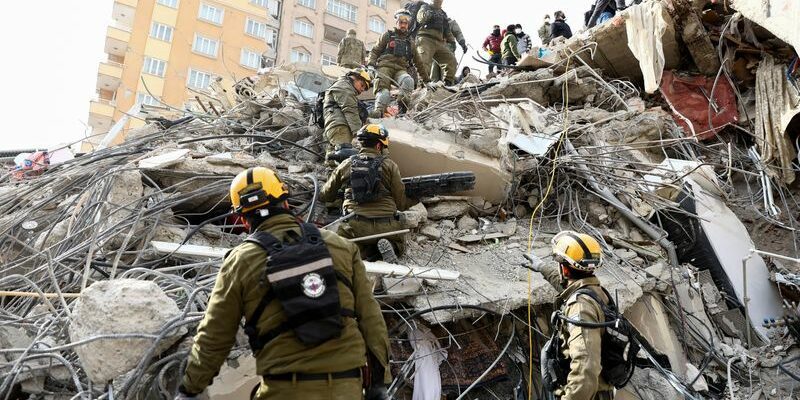by Mehmet Caliskan, Khalil Ashawi and Maya Gebeily
ANTIOCH, Turkey/JINDIRES, Syria (Reuters) – The death toll from Monday’s massive earthquakes in southeastern Turkey and northern Syria has now exceeded 22,000 and hopes of finding survivors are dwindling, as that thousands of buildings were destroyed in many towns in the region.
Several people were however found alive Friday in the rubble of buildings having collapsed in Turkey.
Turkish President Recep Tayyip Erdogan, under fire for his handling of the disaster, admitted that the response from search and rescue teams was not as quick as the government wanted.
“Although we have the largest search and rescue team in the world at the moment, it is a reality that search efforts are not as fast as we would have liked,” he said, adding that the country’s death toll had climbed to 18,991.
In Syria, where the death toll has topped 3,300, President Bashar al-Assad made his first trip to affected areas since the quake, visiting a hospital in Aleppo, according to state media.
The World Food Program (WFP) has said it has run out of supplies in rebel-held northwest Syria as the state of war there is complicating relief operations.
The Syrian government has approved the delivery of humanitarian aid across the front lines of the country’s 12-year civil war, state media said on Friday, adding that aid would reach those who need it with the support of the United Nations, the Syrian Red Crescent and the International Red Cross.
Damascus declared the areas most affected by the deadly earthquake – Latakia, Hama, Aleppo and Idlib – disaster areas and indicated that it would set up a fund to rehabilitate them.
94 COUNTRIES HAVE OFFERED HELP
Hundreds of thousands of people are now homeless and suffering from hunger, thirst and cold, both in Syria and in Turkey.
Search and rescue operations are still continuing and 94 countries have offered their help, said Recep Tayyip Erdogan, who was speaking in Adiyaman province, which was also affected by the earthquakes.
According to a report by Turkey’s Bogazici University, some 40 percent of buildings in the Turkish city of Kahramanmaras, the epicenter of Monday’s main quake, were damaged.
Turkish authorities and the United Nations estimate that around 24.4 million people have been affected in Syria and Turkey.
The 7.8 magnitude quake, which was followed by numerous aftershocks, is considered one of the seven deadliest natural disasters of the centenary.
The World Bank has granted Turkey $1.78 billion in relief and reconstruction funding, of which $780 million will be available immediately. The US Agency for International Development will provide $85 million in emergency humanitarian assistance to Turkey and Syria.
France will for its part deploy from Sunday a civil security field hospital in the region of Adiyamane, in Turkey, to help take care of the wounded. Paris will send 87 rescuers, firefighters and marine firefighters to deploy this structure comprising two operating rooms.
“A civil security prefiguration team left today for southern Turkey to organize the logistics of this deployment,” the French government said in a statement.
(With contributions from Umit Bektas in Antakya, Orhan Coskun in Ankara, Ece Toksabay and Huseyin Hayatsever in Adana, Jonathan Spicer, Daren Butler and Ali Kucukgocmen in Istanbul and Dan Williams in Jerusalem, written by Lincoln Feast and Tom Perry; French version Camille Raynaud, Kate Entringer and Matthieu Protard, edited by Blandine Hénault)
©2023 Thomson Reuters, all rights reserved. Reuters content is the intellectual property of Thomson Reuters or its third party content providers. Any copying, republication or redistribution of Reuters content, including by framing or similar means, is expressly prohibited without the prior written consent of Thomson Reuters. Thomson Reuters shall not be liable for any errors or delays in content, or for any actions taken in reliance thereon. “Reuters” and the Reuters Logo are trademarks of Thomson Reuters and its affiliated companies.
